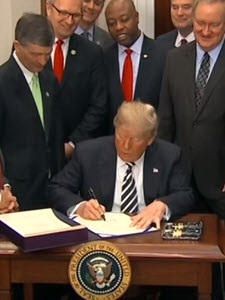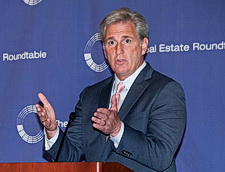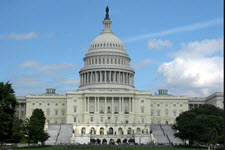The Real Estate Roundtable on Tuesday encouraged Senate Banking Committee leadership to consider a bipartisan measure similar to one passed in the House of Representatives in November that would reform and clarify the Basel III High Volatility Commercial Real Estate (HVCRE) Rule for certain acquisition, development, or construction loans (ADC). (Roundtable Comment Letter, Jan. 9)
 |
|
The Roundtable’s letter this week to Senate Banking, Housing, and Urban Affairs Committee Chairman Mike Crapo (R-ID) and Ranking Member Sherrod Brown (D-OH) expressed concerns about the HVCRE Rule since its effective date of January 1, 2015.
|
The House passed the Clarifying Commercial Real Estate Loans Act (H.R. 2148) on November 7, 2017 following a nearly unanimous vote by the House Financial Services Committee (59-1). Since the Rule’s effective date of January 1, 2015, necessary clarification for key elements of the Rule have not been provided by regulators despite ongoing requests. Instead, the regulatory agencies proposed yet another, duplicative exposure category for ADC loans – HVADC.
This bipartisan legislation – introduced by House Financial Services Committee members Rep. Robert Pittenger (R-NC) and Rep. David Scott (D-GA) – would help address concerns regarding the Basel III HVCRE Rule by amending the Federal Deposit Insurance Act and clarifying requirements for certain ADC loans. Clarification of the HVCRE Rule would ensure that credit capacity and economic activity would not be impeded, while promoting economically-responsible commercial real estate lending. (Roundtable Weekly, Nov. 10)
The Roundtable’s letter this week to Senate Banking, Housing, and Urban Affairs Committee Chairman Mike Crapo (R-ID) and Ranking Member Sherrod Brown (D-OH) expressed concerns about the HVCRE Rule since its effective date of January 1, 2015.
The letter states: “The current rules are overly broad and include many stabilized loans without construction risk in this HVCRE category, unduly burdening stabilized loans with capital charges appropriate to protect banks from heightened construction risks. Many banks, including small community financial institutions, have been deterred from making this type of loan – which can represent up to 50 percent of a small bank loan portfolio.”
The Roundtable also submitted comments on Dec. 21, 2017 to banking agencies in response to their Notice of Proposed Rulemaking (NPR) – “Simplifications of and Revisions to the Capital Rule related to High Volatility Acquisition Development or Construction (HVADC) Exposures” as issued on Oct. 27.
The Roundtable encourages the agencies to review the language in Clarifying High Volatility Commercial Real Estate Loans (H.R. 2148) and utilize such an approach to clarify the current HVCRE rules and build on this construct in a new consolidated HVCRE/HVADC rule.
 |
|
Real Estate Roundtable President and Chief Executive Officer Jeffrey DeBoer commended the Senate Banking Committee for recognizing the important link between bank regulatory policy and economic growth and for taking steps to identify potential ideas that would foster job creation and economic activity.
|
The Roundtable comments on the NPR were submitted through its HVCRE Working Group and Real Estate Capital Policy Advisory Committee (RECPAC) to the Office of the Comptroller of the Currency; the Board of Governors of the Federal Reserve System and the Federal Deposit Insurance Corporation. These comments raise concerns about the creation of yet another exposure category for acquisition, development, or construction loans – High Volatility Acquisition, Development, or Construction (HVADC) – while providing no clarification for the existing High Volatility Commercial Real Estate (HVCRE) Rules. The Roundtable and eight other national policy organizations also submitted a separate, joint letter in late December to the banking agencies about the NPR. (Roundtable Weekly, Dec. 22, 2017)
Following these efforts late last year in the House and comments to the banking agencies, this week’s letter to the Senate Banking Committee leadership also explains how the HVCRE Rule issue is not only a problem for commercial real estate owners and bank lenders – but one for the broader economy. Without adequate credit capacity for commercial real estate lending, jobs and tax revenue will be lost and economic growth impeded. “As financial institutions absorb a multitude of overlapping Dodd-Frank and Basel regulations, we are concerned about the cumulative impact these rules are having on real estate credit capacity, liquidity, capital formation and job growth,” the letter states.
Real Estate Roundtable President and Chief Executive Officer Jeffrey DeBoer also commends the Senate Banking Committee for recognizing the important link between bank regulatory policy and economic growth and for taking steps to identify potential ideas that would foster job creation and economic activity. DeBoer concludes the letter: “We look forward to working with the Senate Banking Committee on measures such as these that will help craft a sensible financial framework for growing a healthy economy.”







